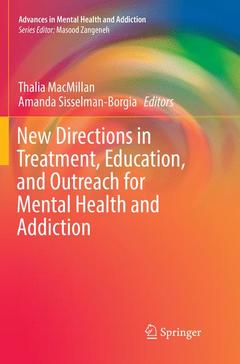New Directions in Treatment, Education, and Outreach for Mental Health and Addiction, 1st ed. 2018 Advances in Mental Health and Addiction Series
Coordonnateurs : MacMillan Thalia, Sisselman-Borgia Amanda

This practice-enhancing volume assembles the latest innovative thinking on working with clients who have both mental health diagnoses and substance use disorders. Diagnosis is a central focus of the coverage, untangling the often-knotty considerations surrounding dual diagnosis and the complex issues surrounding treatment even in frequently seen combinations (e.g., depression/alcohol abuse). The section on practice emphasizes meeting patients where they are and making use of their community, cultural, and spiritual contexts in crafting interventions. And the book?s ambitious chapters on professional development describe training programs with the potential to produce the next generation of responsive, knowledgeable, and flexible therapists.
Among the topics covered:
· Comprehensive assessment of substance abuse and addiction risk in adolescents.
· The relationship between attachment and addiction.
· Addiction in the community: the role of emergency services.
· Substance use during and after major crisis and disaster: a practitioner?s guide.
· Practice, advocacy, and outreach: perspectives on addiction services.· Teaching the importance of developing the therapeutic relationship.
New Directions in Treatment, Education, and Outreach for Mental Health and Addiction equips health and clinical psychologists, social workers, and addiction counselors and educators with a well-rounded understanding of a growing population, and a wealth of perspectives on effective new interventions.
Diagnosis.- Evolution of addiction terminology.- Addiction and self-injury.- Comorbid trauma and addiction.- The relationship between attachment and addiction.- The portrait of addiction.- Practice.- Origins of clinical practice.- Preventing substance abuse and addiction.- Clinical and personal biases in treatment: impact on treatment and how to handle it.- Spirituality, resilience, and addiction.- The Three-legged Stool Model for Spiritual Interventions in the Treatment of Substance Use Disorders.- Models of integrated treatment.- Addiction in the community: the role of emergency services.- Comprehensive assessment of mental health, addiction, and physical health.- A case study of innovative practice.- The role of advocacy in the treatment process.- Education.- Creating programs for professional development and academic programs.- Developing a SBIRT curriculum in advanced practice.- Teaching students the importance of developing the therapeutic relationship.- Integrating previous knowledge and experience into the educational program.- Concluding remarks.
Dr. Sisselman-Borgia is an Assistant Professor at Lehman College in the Department of Social Work, part of the City University of New York. Dr. Sisselman-Borgia has experience teaching across the social work curriculum and recently taught classes entitled, Family Violence and Trauma and Urban Homelessness for undergraduate and graduate social work students. She regularly teaches Advanced Practice in the Urban Environment for MSW students in their final year of study. Dr. Sisselman-Borgia studies the impact of discrimination on homeless youth and adults, trauma and at-risk youth and families, and the intersection between spirituality, religion, and domestic violence/family trauma. Dr. Sisselman-Borgia’s clinical practice has focused mainly on at-risk youth and working with women and children who have experienced trauma.
Highlights intersection of diagnosis, treatment, and education
Updates innovations within these three unique yet intersecting areas
Information can be generalized to a multitude of populations
Date de parution : 12-2018
Ouvrage de 323 p.
15.5x23.5 cm
Date de parution : 03-2018
Ouvrage de 323 p.
15.5x23.5 cm
Thèmes de New Directions in Treatment, Education, and Outreach for... :
Mots-clés :
innovations in addiction education; intersection of addiction treatment and education; helping addicts and their families; addiction counseling; co-morbidity in mental health and addiction; addiction treatment planning; addiction educatlonal curriculum; community services for alcohol and substance abuse; addiction evidence-based practice; co-occuring substance abuse and mental disorders; person-centered addiction care; addiction and self-injury; trauma and adiction; attachment and addiction; clinical and personal biases in addiction treatment; models of integrated addiction treatment; addictiion and community services; addiction and emergency services; role of advocacy in addiction treatment; Three-Legged Stool Model



